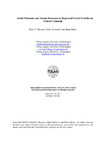Social Networks and Farmer Exposure to Improved Cereal Varieties in Central Tanzania
| dc.contributor.author | Elijah, Muange | |
| dc.contributor.author | Schwarze, Stefan | |
| dc.contributor.author | Qaim, Matin | |
| dc.date.accessioned | 2019-08-02T07:17:16Z | |
| dc.date.available | 2019-08-02T07:17:16Z | |
| dc.date.issued | 2014 | |
| dc.identifier.uri | http://ir.mksu.ac.ke/handle/123456780/4695 | |
| dc.description.abstract | This study uses probit and Poisson models to analyse the determinants of social network links for the exchange of information among 345 cereal farmers and the effects of social networks on farmer exposure to improved varieties in Central Tanzania. Results show that network links are determined by education, wealth, association membership, geographical proximity, kinship ties, community leadership role, and links to extension officers. Further, farmer networks positively affect the intensity of exposure to seed technologies with mostly missing or malfunctioning markets. Moreover, it is information networks outside a farmer’s village, rather those inside the village, that determine intensity of exposure | en_US |
| dc.language.iso | en_US | en_US |
| dc.subject | Social networks | en_US |
| dc.subject | Exposure | en_US |
| dc.subject | Improved varieties | en_US |
| dc.subject | Sorghum | en_US |
| dc.subject | Maize | en_US |
| dc.title | Social Networks and Farmer Exposure to Improved Cereal Varieties in Central Tanzania | en_US |
| dc.type | Article | en_US |
Files in this item
This item appears in the following Collection(s)
-
School of Agricultural Sciences [118]
Sholary Articles by Faculty & Students in School of Agricultural Sciences

